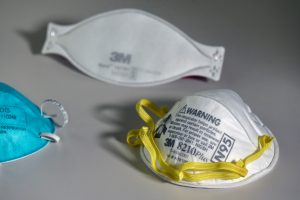PARIS — Coronavirus lockdown rules will be eased incrementally in France starting on Saturday ahead of the Christmas holiday, President Emmanuel Macron announced in a televised address to the nation Tuesday night. He also said that he would not make getting the COVID-19 vaccine compulsory, when it becomes available.
“The peak of the second wave of the epidemic has passed,” Macron said in his sixth and most straightforward address on the coronavirus pandemic since March, noting a drop in COVID-19 cases over the past week. “The spirit of civic responsibility that you showed was effective and we learned to better treat patients.”
The easing of the rules will be in three stages.
The first starts Saturday. The basic current lockdown will remain in place, with working from home encouraged and outings limited but small businesses will be allowed to reopen, places of worship permitted to hold services for up to 30 people at a time and the perimeter for daily outings widened from 1 kilometer to 20 kilometers.
After December 15 — provided daily new COVID-19 cases remain at around 5,000 and the daily number of new cases in ICU stays between 3,000 and 2,500 — the lockdown will be lifted, but a curfew will be in place between 9 p.m. and 7 a.m. except on Christmas Eve and New Year’s Eve. Travel will be permitted to allow people to spend Christmas with family, and museums, cinemas and theaters will be allowed to reopen.
“But I call upon your sense of responsibility: This will certainly not be a Christmas like the others,” Macron said, urging the French to continue being vigilant and implementing social distancing, wearing masks and washing hands.
Restaurants, bars and gyms will be the last to reopen, on January 20 if the epidemic remains contained and doesn’t surge after the holidays.
Macron only mentioned coordination with European partners when it came to reopening winter sports resorts, but European Commission President Ursula von der Leyen underlined the importance of coordinating the easing of current restrictions related to coronavirus at a virtual European Council summit held last week.
“We will make a proposal for a gradual and coordinated approach to lifting containment measures. This will be very important to avoid the risk of yet another wave,” von der Leyen said.
Business owners shut down during lockdown will get additional financial support to soften the economic blow, with a state-funded compensation scheme providing 20 percent of their anticipated revenue during the period (based on 2019 figures) or up to €10,000.
“We must do everything to avoid a third lockdown,” Macron said, adding France had three tools to try and make sure this happens: responsible personal behavior, a testing strategy, and the arrival of the vaccine.
“Our strategy relies on several vaccines. Some will be available at the end of December-early January and a second generation will arrive in the spring,” Macron said.
With high vaccine skepticism in France and rising conspiracy theories and suspicion about government policies, Macron sought to reassure people about the measures the government would take to ensure the vaccine would be safe, including involving a scientific committee and a citizens’ collective.
“Vaccination must be done in a clear, transparent way, by sharing at every stage all the information on what we know and don’t know. I want to be clear: I will not make vaccination compulsory,” Macron announced.
Macron had announced a second nationwide lockdown at the end of October to stem the spread of the second wave of the coronavirus. But this lockdown has been looser than the first one imposed in the spring, with schools remaining open. However, restaurants, bars, gyms and theaters have been shut.
The French government, like other governments facing this unprecedented pandemic, has been trying to find the right balance between necessary protective health measures to stem the spread of the virus and limiting the economic fallout.
Economic conditions have been deteriorating, with NGOs noticing more people showing up to food distribution points, including many young adults and students.
“We are seeing a sharp rise in demand from the student population hit by the crisis,” according to Patrice Blanc, president of Les Restos du Coeur, an NGO that distributes meals and that has just launched its annual fundraising drive.
Despite the crisis, Macron has generally held steady in the polls with 41 percent of favorable opinion, still significantly higher than both his predecessors at the same point of their presidencies, according to a November Ifop opinion poll.



















